
These Historic Towns in North Dakota Are Worth Exploring
The towns of North Dakota are soaked in Midwest history while sustaining the cultural legacies passed on to them from generations long forgotten. These towns reflect untainted historic allure in their museums, historic districts, environments, food, and lifestyle of locals. From the frontier village in Jamestown and its Bison heritage to the historic trading posts of Walhalla and Pembina, the past comes alive in North Dakota. In addition, the atmosphere in these towns is warm and welcoming, making each visitor feel at home. Immerse wholly into the rich history of the Midwest by visiting these incredible towns in North Dakota.
Walhalla

Street view in Walhalla, North Dakota. By In memoriam afiler - Flickr, CC BY-SA 2.0, Wikimedia Commons
Walhalla is a small town on the banks of the Pembina River near the United States border with Manitoba, Canada. It holds a remarkable history as one of the oldest towns in North Dakota, established in 1845. The town is also renowned for its many trading posts as it was once a booming fur trade zone over the Red River Valley. Today, trading posts such as Gingras in the Gingras State Trading Post Historic Site still exist to reflect the town's rich commercial heritage. Another trading post in town is the Kittson Trading Post, built by an American Fur Company agent, Norman Kittson, in 1843, making it one of the oldest buildings in North Dakota. The Kittson Trading Post is located within the Walhalla State Historic Park.
Wahpeton

Dakota Avenue (North Dakota Highway 13) in downtown Wahpeton, North Dakota. By Tim Kiser, CC BY-SA 2.5, Wikimedia Commons
Wahpeton is famed as the home of the world's largest catfish statue - Wahpper, which is a side attraction for visitors. On the main business of history, Wahpeton features the iconic Richland County Historical Society Museum where visitors will be overwhelmed by native American relics and exhibits that reflect the days of American pioneers. This museum is open from mid-April to October unless by appointment. Wahpeton is also home to the Ringling Bros. Circus Monument, another historic highlight attraction that honors two circus workers struck by lightning in 1897 while building the circus tent.
Garrison
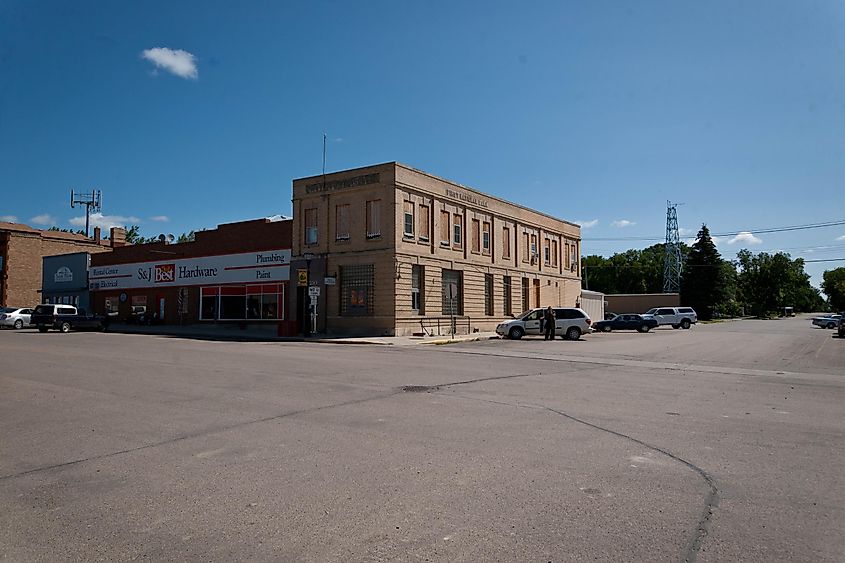
Street view in Garrison, North Dakota. By Andrew Filer - Flickr, CC BY-SA 2.0, Wikimedia Commons
The small town of Garrison in McLean County packs a handful of delights for history buffs as it is home to museums, forts, and halls of fame reflecting the glorious past of North Dakota. Visitors to this town will be met with attractions like the North Dakota Fishing Hall of Fame, which honors distinguished personalities who have contributed to the growth of sport fishing in the state. The town also features the North Dakota Fire Fighters Hall of Fame and Museum, dedicated to firefighters from across the state who have lost their lives on the job. This hall of fame and museum houses firefighting relics, gear, antique firefighting trucks, and photos of outstanding firefighters.
Some more attractions that make this town so historic include - the Fort Stevenson State Park, which is home to a reconstruction of the 19th century Fort Stevenson. This fort was dedicated to the Civil War General Thomas G. Stevenson, who was killed in one of the battles of the American Civil War. While a large part of the fort has been buried under Lake Sakakawea, the Fort Stevenson State Park was developed to preserve the area’s rich history and now includes a replica of the fort’s guardhouse, which also serves as a museum. Lake Sakakawea also offers plenty of recreational activities.
Medora
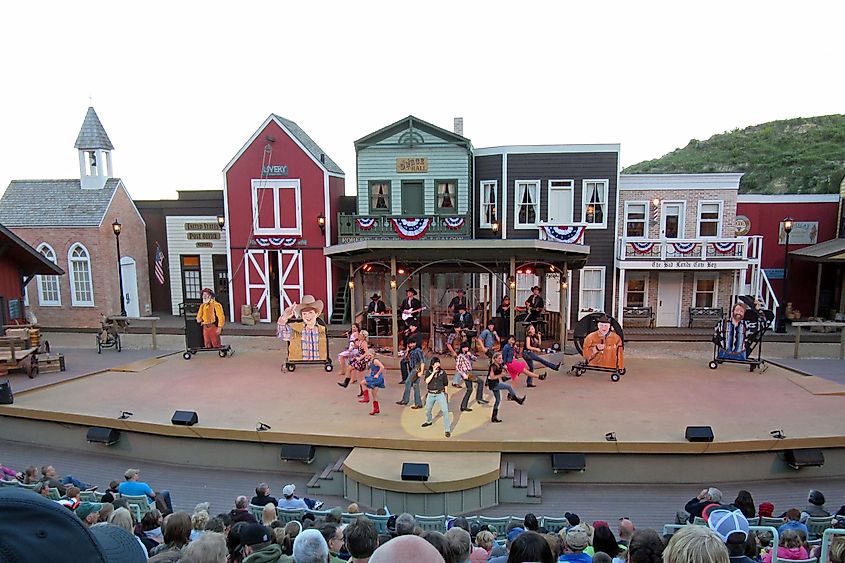
Medora Musical: Summer event at 2,900-seat Burning Hills Amphitheatre, Medora, North Dakota.
Medora is a small town that punches above its weight when it comes to history. This town was founded in 1883 by Frenchman Marquis de Mores and it holds a rich history of North Dakota's western heritage and lifestyle. Visitors can learn more about this unique lifestyle of the Midwest at the North Dakota Cowboy Hall of Fame, which commemorates the experiences of native Americans, cowboys, rodeos, and homesteaders. For some history about Medora's founder, check out the Chateau de Mores, which was once his meat factory but is now a historic site, with a museum housing some of his original possessions since 1883, among other relics. Also, do not miss Maltese Cross Cabin, the same cabin President Theodore Roosevelt called his home whenever he was in North Dakota.
Williston
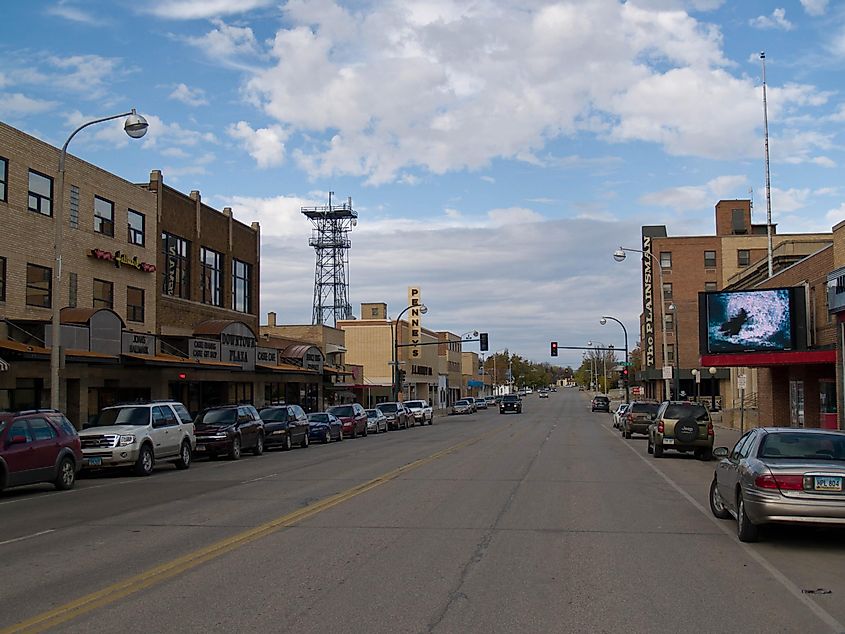
Main Street in Williston, North Dakota. By Andrew Filer - Williston, North Dakota, CC BY-SA 2.0, Wikimedia Commons
Williston is a town in North Dakota that stands tall when it comes to the rich history of the American Midwest. The town was founded in 1887 and is famous for hosting a partial reconstruction of the Fort Union Trading Post National Historic Site which was the most important fur trading post in the upper Missouri River between 1829 and 1867. This trading post was mainly instrumental in the meeting of Indigenous people with people of European and Canadian ancestry.
Williston also features Fort Buford, a former army post at the confluence of Missouri and Yellowstone Rivers, which was the site where Sitting Bull, a Hunkpapa Lakota leader, surrendered in 1881 after fighting against the US government for years.
In addition, Williston is home to the Missouri-Yellowstone Confluence Interpretive Center, a great place to learn more about the rich history of the area where the Missouri River and Yellowstone River meet.
Dickinson
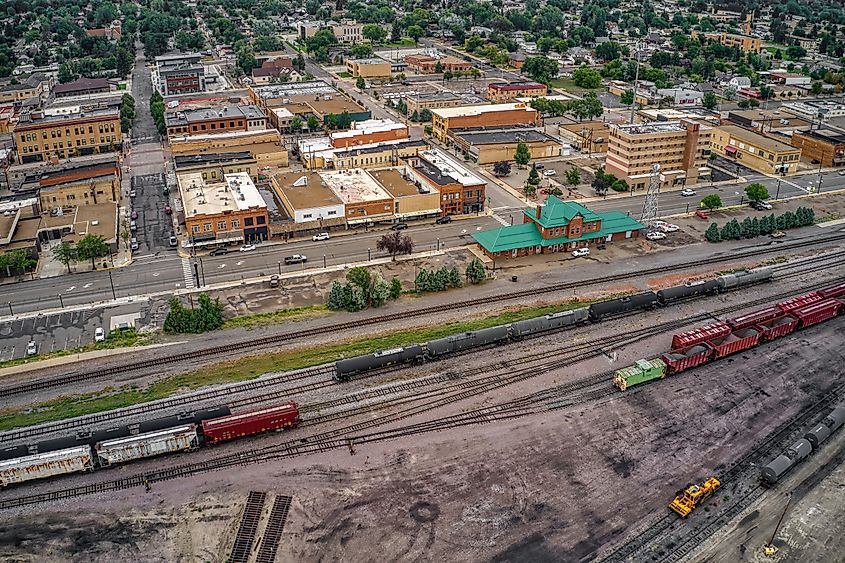
Aerial view of downtown Dickinson, North Dakota, in summer.
Dickinson is a charming town in Stark County with a rich history dating to the late 1800s. The area was initially a settlement known as Pleasant Valley Siding which was founded as a stop on the Northern Pacific Railway. By 1881, several buildings were built in the area, and in 1883, it became an established town with a new name - Dickinson. Today, the town is most famous for being the gateway to the Theodore Roosevelt National Park, which is dedicated to Theodore Roosevelt - the 26th president of the United States. Dickinson is also home to the Dickinson Museum Center, which features life-sized dinosaurs and thousands of specimens that reveal more about the area during prehistoric times. The Pioneer Machinery Hall is one more historic attraction in Dickinson worth checking out as it features early ranching and agricultural objects from Stark County.
Valley City
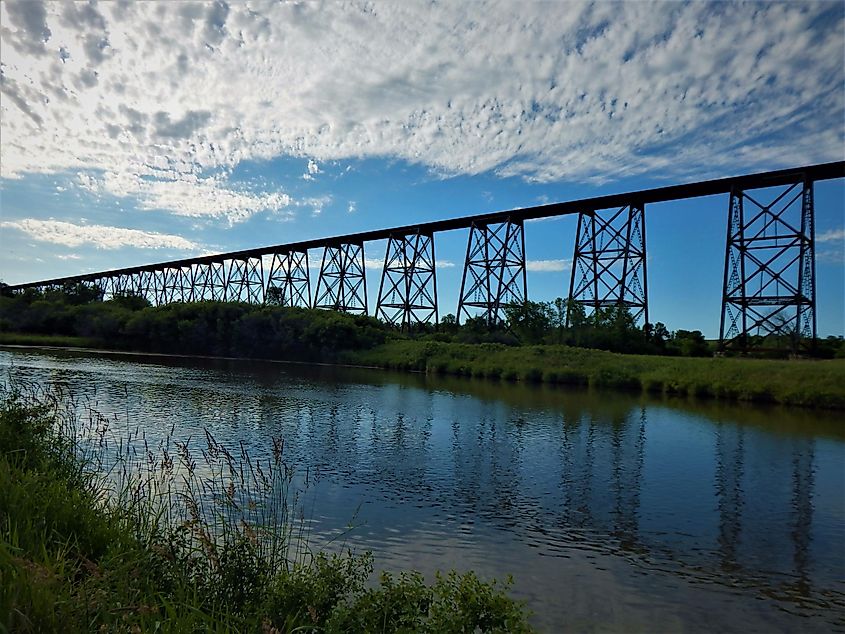
Valley City is a picturesque small town famous for its numerous bridges which have earned it the title - City of Bridges. One of the town’s bridges, known as the Hi-line Railroad Bridge, is particularly historic and was even the longest bridge in the world when it was constructed in 1908. Today, this bridge remains one of the longest and highest single-track railroad viaducts in the US.
For a more comprehensive exploration, visitors to Valley City can embark on the Valley City Historic Bridges Tour to see the town's eight historic bridges over the Sherenne River, either on foot or by car, while learning more about their origins.
For more history of Valley City, visitors can head over to the Barnes County Historical Society Museum - the oldest county museum in North Dakota, where exhibits of the town's historic past are on display.
Jamestown
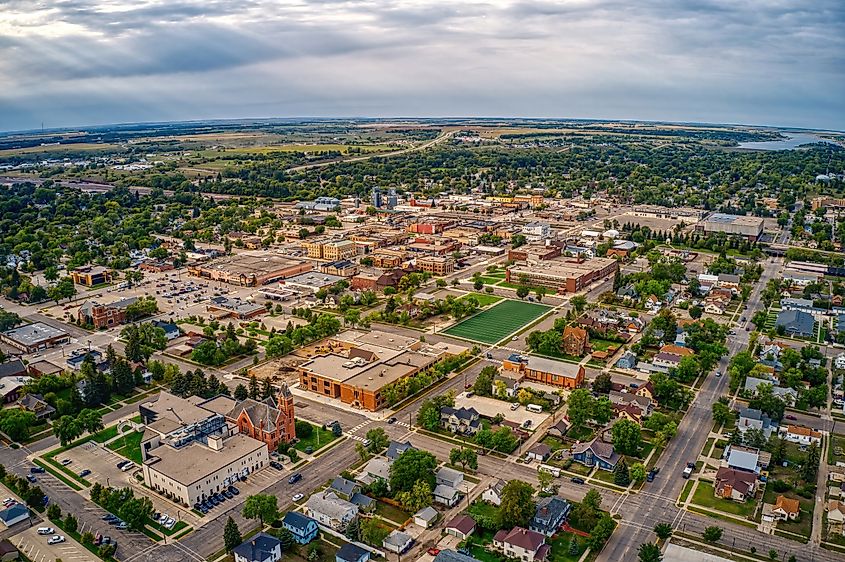
Aerial view of Jamestown, North Dakota, along Interstate 94.
Jamestown is one of the oldest towns in North Dakota. It was founded in 1883. The town is particularly famous for the American Bison and is a great place to learn more about this national animal, especially with attractions like the National Buffalo Museum. Jamestown even features the world's largest buffalo - a sculpture of the American Bison standing at 26 feet.
Jamestown is also rich in North Dakota sports history as it is home to the North Dakota Sports Hall of Fame, where statesmen and women who have achieved laudable feats in sports are honored.
One more exciting attraction that makes this town so historic is the Frontier Village, a historic district housing authentic buildings as well as relics and artifacts from frontier villages across North Dakota.
Uncover the Historical Tapestry of North Dakota's Towns
North Dakota offers a glimpse into the glorious past of the Midwest region across its numerous small towns such as those on this list. These towns have a reputation for preserving native American cultures and history, making them the first destinations people think of when visiting North Dakota for history tours. North Dakota towns are cozy, scenic, and less crowded, with some towns like Medora having just 121 residents. Thus, visitors can satiate their pangs for history without the crowd, relishing each moment like it is the last and packing up memories to cherish. History is safe and not threatened by civilization in the towns of North Dakota, and it takes only one visit to agree.











